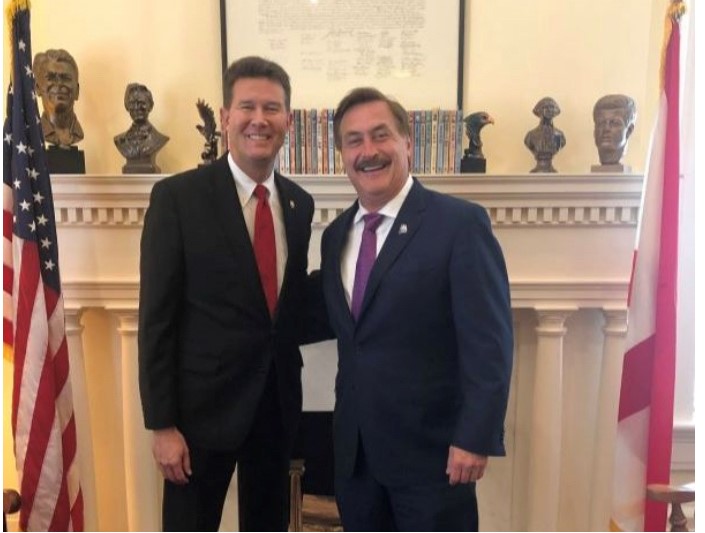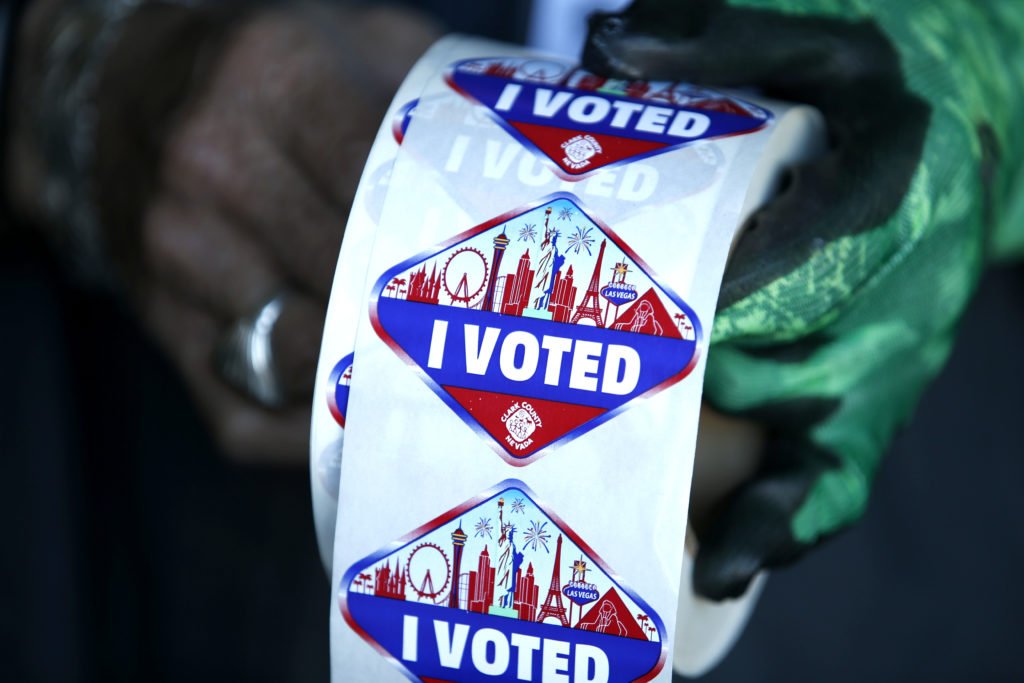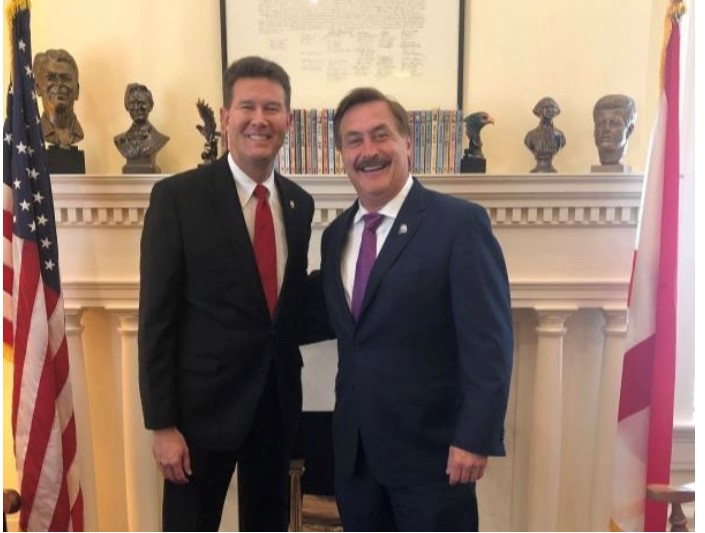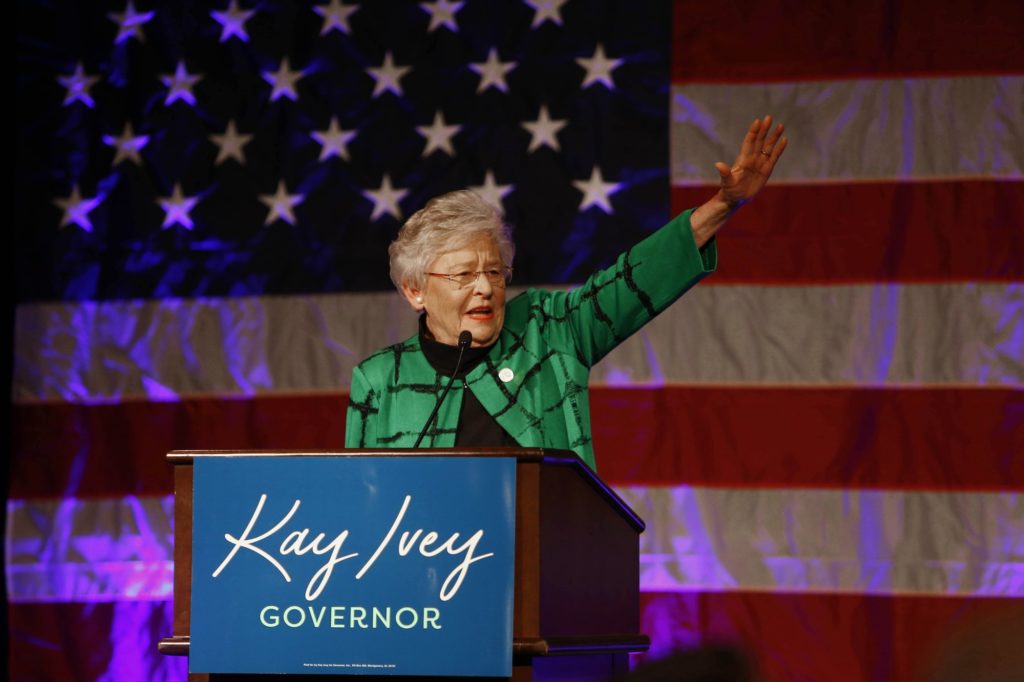“If voting is not secure then nothing is secure,” attorney states after vote counting machine lawsuit is dismissed

On Friday afternoon, Montgomery Circuit Judge Greg Griffin dismissed a lawsuit challenging the state of Alabama’s use of vote counting machines. He also dismissed a motion by the plaintiffs in the case for a preliminary injunction that would have led to the hand-counting of ballots in the general election on November 8. The plaintiffs released a statement afterward lamenting Judge Griffin’s decision to dismiss their lawsuit. “Steve Marshall, John Merrill, and the members of the electronic voting committee were provided a video of an electronic voting machine counting counterfeit ballots,” said plaintiffs’ attorney Melissa Isaak in a statement. “It was irrefutable that the machines were not functioning properly, and there has been no concern shown from any of these elected officials.” “In May of this year, John Merrill said that the “hardened” stand-alone computers used in the election “cannot be connected to the internet.” This was shown in court to be false as Wifi and Bluetooth connectivity was specifically requested in Merrill’s own purchase orders,” Isaak continued. “Plaintiffs presented the world’s top cyber security experts who testified that Alabama’s electronic voting systems are NOT secure, and even if not connected to the internet, they can still be hacked.” “We showed without dispute or opposition that the voting equipment to be used in the 2022 primary did not work properly but accepted fake ballots,” plaintiffs’ attorney Jay Hinton said. “Yet, the state used them anyway. We will continue to fight for all Alabama voters to make sure that their votes are ‘counted’ in a constitutional way.” “Voter security is the most important issue of our time. If voting is not secure – then nothing is secure,” said plaintiffs’ attorney Phillip Jauregui said. “We brought our nation’s best experts into court, and they proved that our voting systems are insecure, uncertified, and accept fake ballots. We believe the Alabama Supreme Court will apply the law to the shocking facts in this case and protect our voting rights.” Jauregui’s comments suggest that the plaintiffs intend to appeal Judge Griffin’s ruling. The plaintiffs in the lawsuit were Focus on America, former gubernatorial candidate Lindy Blanchard, State Rep. Tommy Hanes, and Dr. David Calderwood. Blanchard later stepped away from the lawsuit, suggesting that write-in gubernatorial candidates were using the lawsuit as a vehicle to promote their campaigns. Blanchard emphasized that she supports the whole Republican ticket. “I’m very disappointed in Judge Griffin’s ruling,” stated Rebecca Rogers of Focus on America. “He could have taken an epic stand for election integrity, but he chose to support the status quo instead.” “We presented evidence at the August 30 hearing that Alabama’s voting machines are vulnerable to hacking,” Rogers continued. “We know that at least some machines misread copied ballots as valid because that’s been shown to happen. With all the controversy surrounding elections today, we were asking the Judge to rule in favor of a method of counting that’s been used for centuries to give honest results–hand counting the ballots. Apparently, Judge Griffin accepted the State’s assurances that all was well and that there wasn’t anything to see here with our election machines.” Marshall, who is defending the state, asked that the case be dismissed. In the ruling, Griffin stated, “Plaintiffs fail to establish irreparable harm because their alleged injury is speculative. Further, the named Plaintiffs have failed to offer any testimony—whether by declaration or live at the hearing—to substantiate any allegations regarding their own circumstances. And without such evidence, Plaintiff has not met their burden to show that they themselves would suffer immediate and irreparable injury.” The Secretary of State’s office maintains that Alabama has the most secure voting system in the country. To connect with the author of this story, or to comment, email brandonmreporter@gmail.com.
Court dismisses vote counting machine lawsuit

Friday, Montgomery Judge Greg Griffin issued an order dismissing a lawsuit seeking to block the use of vote counting machines in the November 8 general election. Alabama Attorney General Steve Marshall sought to dismiss the lawsuit against the state. The plaintiffs asked for a preliminary injunction to block the use of the vote counting machine. Judge Griffin allowed both sides to prevent evidence supporting their motions but ultimately found in favor of the State of Alabama. On Friday, Judge Griffin granted the State’s motion to dismiss the lawsuit and rejected the plaintiffs’ motion for a preliminary injunction to halt the use of the voting machines. “Plaintiffs’ suit is due to be DISMISSED, and the Plaintiffs’ Motion for Preliminary Injunction is due to be DENIED,” Judge Griffin wrote in his decision. “As to the Motion to Dismiss, this Court lacks subject matter jurisdiction because Plaintiffs have alleged only a speculative injury that does not support standing. The Court additionally lacks subject matter jurisdiction because Plaintiffs’ alleged injuries are neither traceable to nor redressable by Defendants, because sovereign immunity pursuant to § 14 of the Alabama Constitution bars this suit, and because the jurisdiction-stripping statute bars this suit. This Court holds that even if it were to reach the merits, it would find that Plaintiffs fail to state a claim. Plaintiffs’ Motion for Preliminary Injunction is denied as moot. This Court finds that if it reached the Motion for Preliminary Injunction, it would be denied because Plaintiffs failed to meet the four required elements of a party seeking a preliminary injunction to which no preliminary injunction can issue. Plaintiffs have a higher burden than usual because they seek a mandatory preliminary injunction that would change the status quo.” “Plaintiffs fail to establish irreparable harm because their alleged injury is speculative,” Griffin wrote in his final judgment. “Further, the named Plaintiffs have failed to offer any testimony—whether by declaration or live at the hearing—to substantiate any allegations regarding their own circumstances. And without such evidence, Plaintiff has not met their burden to show that they themselves would suffer immediate and irreparable injury. Additionally, Plaintiffs have not shown that they are likely to prevail on the merits, and they have not shown that the balance of equities weighs in their favor given the significant financial and administrative burdens that their requested relief would impose and given that the 2022 General Election is only 59 days away.” Judge Griffin dismissed the case with prejudice. The case was brought by former Republican gubernatorial candidate Lynda Blanchard, State Rep. Tommy Hanes, Focus on America, and Dr. David Calderwood. Blanchard dropped out of the case and was replaced by former Alabama Governor Don Siegelman. The case was supported by lawyers for Mike Lindell. The My Pillow founder and CEO has claimed that the 2020 presidential election was stolen from then President Donald J. Trump. Blanchard said that she supported “the whole Republican ticket” and that the case was being used to promote write-in campaigns. Both Dean Odle and Jared Budlong are running write-in campaigns. Alabama Today spoke with Alabama Secretary of State John H. Merrill, the lead defendant in the case, following the Judge’s ruling. “28 and 0,” Merrill said, referring to the number of court challenges that the Secretary of State’s office has defeated in his tenure as Secretary of State. “This proves once again that we have the most dependable, the most reliable, and the most accountable election system in the country, and that has been verified by three different independent groups as well as by the courts. The only people who have not accepted that are those groups who have agendas to promote.” The state will use vote counting machines in the November 8 general election. To connect with the author of this story, or to comment, email brandonmreporter@gmail.com.
Court hears court case challenging the integrity of the state’s vote counting machines

On Tuesday, a Montgomery judge heard a lawsuit seeking to end the state’s use of electronic vote counting machines. The plaintiffs claim that the use of electronic vote counting machines adds the ability for election integrity to be undermined by bad actors and creates an unacceptable layer of inaccuracy in Alabama elections. Allegations that the state strongly denies. The case is being brought by Focus on America (FOA) State Rep. Tommy Hanes, Dr. David Calderwood, and then gubernatorial candidate Lindy Blanchard. Blanchard has since left the case because she says that she supports the full Republican ticket and that the case is being used to advance a write-in campaign. Former Alabama Governor Don Siegelman has joined the lawsuit in her place. The Alabama Attorney General’s office filed a motion asking that the Judge dismiss the case. Alabama Today spoke with write-in gubernatorial candidate Dean Odle about the court proceedings. “The judge decided to hear the case,” Odle stated. Odle said that the case is about “cybersecurity.” “The most sophisticated weapons the U.S. military has can be compromised,” Odle commented, quoting retired Col Sean Smith, who was an expert witness for the plaintiffs. “Focus on America wants an election process that the voters of Alabama can have confidence in and that accurately counts every legal vote cast,” Focus On America spokeswoman Rebecca Rogers said in a statement. “Knowing that our machines can be hacked even when they are not connected to the internet, we believe that right now, the best option for a fair vote count in November is to put the machines aside and hand count the ballots. We have some serious concerns about the election machines in use all across the state, which is why we joined State Representative Tommy Hanes’s lawsuit against Secretary of State John Merrill and the Electronic Voting Committee.” Focus on America is allied with My Pillow founder Mike Lindell and Lindell’s attorneys played a prominent role in the court hearing. Lindell has drawn national attention for his claims that the 2020 presidential election was ‘stolen’ from then President Donald Trump. “The machines by ESS (the systems that the state of Alabama purchases) and Dominion are the worst,” Odle said. Secretary of State Merrill has stated that the vote counting machines that the state uses do not connect to the internet and do not even have modems where they could connect to the internet. “That’s what he says,” Odle replied. “The laptops they use to tabulate the vote, those very computers have both wife and Bluetooth.” “Someone could alter those machines with a program on a thumb drive,” Odle stated. “There are 80 to 200 vulnerabilities,” in Alabama’s election processes, Odle said the expert witnesses testified. Odle said that the plaintiffs’ experts told the court to, “Melt them down and bury them. They cannot be secured.” Odle and Blanchard were among eight Republican candidates defeated by incumbent Governor Kay Ivey in the May 24 Republican primary. On Thursday, the state Alabama Electronic Voting Committee went into executive session to discuss the pending legal case. Alabama Today spoke with Secretary of State Merrill on Friday. “We don’t comment on pending litigation,” Merrill said. “What I can say is that Alabama has the safest, most transparent, and accountable voting process in the nation. And that is not just us saying it, but an independent national review that looked at all the from other states in the country. We believe that when the court reviews all of the evidence that they will come to the same conclusion.” To connect with the author of this story, or to comment, email brandonmreporter@gmail.com.
Hearing on voting machine lawsuit is today

A judge will hear a motion to dismiss a lawsuit challenging the use of vote counting machines today in Montgomery at 9:00 a.m. The lawsuit was originally brought by Republican primary candidate Lindy Blanchard and State Rep. Tommy Hanes. The candidates had originally sought to bar the use of the vote tabulation machines in the May 24 Republican primary. Both Hanes and Blanchard lost in the primary. Hanes, the incumbent, lost to challenger Republican Mike Kirkland 3,707 48.4% to 3,950 51.6%. Kirkland is unopposed in the general election. Blanchard finished second to incumbent Gov. Kay Ivey, but the popular incumbent received 54.8% of the vote in the primary, besting Blanchard and seven other primary opponents combined to avoid a Republican primary runoff. No incumbent governor in Alabama has lost their party primary since George C. Wallace beat incumbent Gov. Albert Brewer in the 1970 Democratic primary. Three incumbents have lost general elections. Failing to block the machine tabulation of both the primary and primary runoff votes, the lawsuit is now just challenging the use and accuracy of the machines in general. Blanchard has left the lawsuit, which is being supported by My Pillow founder and CEO Mike Lindell. Former Gov. Don Siegelman has taken Blanchard’s place in the lawsuit. Siegelman, the last Democratic governor in Alabama history, maintains that he actually won the 2002 general election to then-Congressman Bob Riley. The Republican Party has won the last five gubernatorial elections, and incumbent Gov. Kay Ivey is expected to win re-election on November 8. The Alabama chapter of the ultra-MAGA group Focus On America (FOA) is continuing to support the lawsuit. Supporters and members of the group are being asked to attend Tuesday’s hearing to show support. Signs will not be allowed in the courtroom. Secretary of State John H. Merrill has maintained that the vote counting machines, which do not connect to the internet, are both safe and accurate. Merrill said in a statement after meeting with Lindell, “Every Alabamian should be proud that Alabama was recognized as the gold standard for election administration for the first time in our state’s history by the Concerned Women for American Legislative Action Committee. We will continue to work with those like Mr. Lindell and other concerned citizens to provide complete transparency.” Alabama Attorney General Steve Marshall has filed a motion to dismiss the lawsuit citing a lack of grounds. If the motion to dismiss is denied, the case could move forward to the trial stage in the coming weeks. Merrill maintains that replacing the vote tabulation machines with hand counts by poll workers, like Russia and some countries still use, will slow the vote counting down and add an opportunity for potential fraud as well as mistakes by the human vote counters. To connect with the author of this story, or to comment, email brandonmreporter@gmail.com.
Several Alabama legislators lose to primary challengers

At least six members of the Alabama Legislature lost to primary challengers on Tuesday, according to unofficial returns, and several races are yet to be decided. In one of the tightest races, Republican Sen. Tom Whatley of Auburn is trailing challenger Jay Hovey by four votes, according to unofficial returns. Provisional ballots will be counted next week. Hovey is a member of the Auburn City Council. In the House of Representatives, Rep. Will Dismukes of Prattville lost to challenger Jerry Starnes. His defeat came after a series of political and legal troubles. Dismukes had faced calls for his resignation in 2020 after participating in a celebration marking the birthday of Nathan Bedford Forrest — the Confederate general who was also an early Ku Klux Klan leader. He also faced a theft charge related to a dispute with a former employer. Other incumbent defeats, according to unofficial returns, included: — Republican Rep. Joe Faust of Fairhope, a 20-year veteran of the House was defeated by Jennifer Fidler. — Republican Rep. Dickie Drake of Leeds was defeated by Susan DuBose. — Republican Rep. Tommy Hanes of Bryant was defeated by Mike Kirkland. — Republican Rep. Proncey Robertson of Mount Hope was defeated by Ernie Yarbrough. — Democratic Rep. Ralph Howard of Greensboro was defeated by Curtis Travis. Republican Rep. Gill Isbell of Gadsden is trailing challenger Mack Butler, who previously served in the Legislature. But the race is caught in a mix-up where some voters got ballots with the wrong House district. Secretary of State John Merrill said they did not know how many voters were affected. Democratic Rep. Rod Scott of Fairfield was forced into a runoff with a challenger. In another notable contest, House Rules Chair Mike Jones, one of the most influential members in the House of Representatives, appears to have lost to Coffee County Commissioner Josh Carnley in his bid to join the Alabama Senate. Unofficial returns showed Carnley avoiding a runoff with Jones by a margin of about 50 votes. The two are seeking the GOP nomination for the state Senate seat being vacated by retiring Sen. Jimmy Holley. Former longtime state Sen. Hank Sanders of Selma will go to a runoff with Robert L. Stewart for the Democratic nomination for District 23. Sanders represented the district from 1982 to 2018. His daughter, Sen. Malika Sanders-Fortier, won the seat in 2018 but is leaving the state Senate to run for governor. Republished with the permission of The Associated Press.
The NRA Political Victory Fund announces primary endorsements

The NRA Political Victory Fund (NRA-PVF) has announced its endorsements for the May 24 primary in Alabama. The NRA-PVF is NRA’s political action committee. The NRA-PVF ranks political candidates – irrespective of party affiliation – based on voting records, public statements, and their responses to an NRA-PVF questionnaire. Mo Brooks received the endorsement and A rating for the U.S. Senate seat and incumbent Rep. Mike Rogers got an A rating and was endorsed for the U.S. House of Representatives. For the governor’s race, the group gave an A rating and endorsement to incumbent Kay Ivey. Incumbents continued to take the top spots in the Attorney General, State Senate, and House of Representatives elections. AG Steve Marshall received an A rating along with incumbent State Senators Tim Melson (Dist. 1), Tom Butler (Dist. 2), Steve Livingston (Dist. 8), Randy Price (Dist. 13), Dan Roberts (Dist. 15), Shay Shelnutt (Dist.17), Tom Whatley (Dist. 27), and Mike Jones (Dist.31). For the State House of Reps., the following incumbents received an A rating and endorsement: Phillip Pettus (Dist. 1), Parker Moore (Dist. 4), Proncey Robertson (Dist. 7), Tim Wadsworth (Dist. 14), Tommy Hanes (Dist. 23), Nathaniel Ledbetter (Dist. 24), Gil Isbell (Dist. 28), Debbie Wood (Dist. 38), Ginny Shaver (Dist. 39), Dickie Drake (Dist. 45), Jim Carnes (Dist. 48), Brent Easterbrook (Dist. 65), Jeff Sorrells (Dist. 87), Will Dismukes (Dist. 88), Rhett Marques (Dist. 91), and Matt Simpson (Dist. 96). State House of Rep. candidates that are not incumbents that received an A rating and an endorsement include Michael Hart (Dist. 49) and Troy Stubbs (Dist. 31). For the Sheriff’s elections, the following candidates received an A rating and endorsement: Max Sanders (Lawrence County), Joshua McLaughlin (Limestone County), Eric Balentine (Colbert County), and Matt Gentry (Cullman County).
Ed Packard expresses concern about Alabama legislature failing to pass election integrity bills

Ed Packard, Republican Party candidate for Secretary of State, expressed concern about the Alabama Legislature’s failure to pass SB46, SB249, and HB204, election integrity bills introduced in its 2022 Regular Session. Packard released the following commentary in a press release. “The Alabama Legislature’s failure to enact these three bills concerns me,” Mr. Packard exclaimed. “I understandthat the State Senate and State House had many issues of serious concern before them during the legislative sessionthat ended this past week. These bills were no different. Given the concerns of Alabama voters about electionintegrity and confidence in our election system, especially since the 2020 presidential election, it is a gravedisservice to the good people of Alabama to not pass this legislation into state law.” SB46, sponsored by state Senator Clyde Chambliss (R-Autauga, Chilton, Coosa, Elmore, and Tallapoosa Counties),would have prohibited Alabama’s electronic voting machines from being equipped with technology that wouldpermit remote connections to those ballot tabulators. The technologies banned by the bill include Wi-Fi, Ethernet,Bluetooth, Near Field Communications, and any similar technologies. “Not just since 2020, but even before that, Alabamians have been concerned with the potential for hacking ourvoting machines,” Mr. Packard explained. “Some will tell you our voting machines cannot be hacked. However,any computerized device can be hacked if a person knows how to program software or firmware and if that personhas access to the voting machines, especially the flash drives that contain the instructions for how the votingmachines count ballots.” “While our counties do a great job of physically securing our voting machines, state law does not prohibit thosevoting machines from being accessed through the Internet or other attack vectors, such as Bluetooth technology,”Mr. Packard, a 24+ year veteran of the Secretary of State’s office continued. “As a former member of the AlabamaElectronic Voting Committee, I and my colleagues on that committee voted to not approve for use in Alabama anyvoting machines that contain technology for accessing those devices remotely. Unfortunately, state law does notprohibit those technologies from being installed in our voting machines. And now, the leadership in the AlabamaHouse of Representative has signaled they are not concerned about that fact and that they are not aligned with somany Alabamians who are concerned about the security of our voting machines.” Mr. Packard noted that Senator Chambliss’ bill had cleared the Alabama Senate and came out of committee in theAlabama House of Representatives and was due for a floor vote as early as day 12 of the legislative session. Whenthe Legislature adjourned last week, the leadership of the Alabama House had not brought SB46 up for finalconsideration by that body’s members. SB249, sponsored by state Senator Sam Givhan (R-Madison County), identified new election crimes and clarifiedlanguage in the Code of Alabama regarding current election crimes. “Passage of this bill by the AlabamaLegislature would have continued the important work of rooting out election fraud and promoting and strengtheningthe confidence of Alabamians in our elections,” Mr. Packard explained. “SB249 could have been better,” Mr. Packard stated. “I encouraged Senator Givhan and other members of the stateSenate and House to amend this legislation. The legislation should have punished anyone who commits a felonyelection crime with the loss of their voting rights. Unfortunately, this legislation was postponed indefinitely in theAlabama Senate, so it was not passed in its original form or with this stern punishment for actions that undermineour representative democratic form of government.” HB204, sponsored by state Representative Tommy Hanes (R-Jackson and DeKalb Counties), would have addressedthe concerns of many Alabamians who wanted the 2020 general election in Alabama to be audited, given concernsthat have arisen nationally regarding voter fraud and malfeasance. “There is obviously a public interest in ensuring that Alabamians’ have confidence in our elections,” Mr. Packardclaimed. “Auditing elections is one process that can help maintain or strengthen voters’ confidence.” “As I have reported previously,” Mr. Packard continued, “Alabama is one of only a handful of states that does notrequire or permit audits of our elections. As I have stated during my campaign for Secretary of State, I believe thatthe Alabama Legislature should require audits for all elections.” “Unfortunately, HB204 languished in the Legislature since its introduction on February 2, 2022,” Packardobserved. “Alabamians may have varying opinions as to whether the 2020 general election should be audited orabout how that audit should be conducted. However, the appropriate legislative committees should have broughtHB204 up for consideration and let those opinions be examined in the bright light of day.” The Alabama Legislature did give final passage to HB194 sponsored by Representative Wes Allen (R-Dale and PikeCounties). The legislation is now awaiting Governor Kay Ivey’s signature. This bill prohibits state and localelection officials from soliciting, accepting, using, or disposing of certain donations from people or nongovernmentalentities for utilization in election administration in Alabama. “I agree that interest groups, including those from out of state, should not be permitted to inject money or materialgoods into Alabama elections with the intent to corruptly influence the conduct of elections in Alabama,” Mr.Packard stated. “However, I’m unsure why this legislation was given preferential treatment over the very substantiveconcerns addressed by SB46, SB249, and HB204.” “I am further concerned that Representative Allen’s bill seems to be based on the presumption that Alabama’selection officials at the state, county, and municipal levels are inclined to be corrupted by the donations prohibitedHB194,” Mr. Packard suggested. “I have worked with Alabama’s elections officials at all levels of government for29 years, with over 24 of those years while as a staff member of the Secretary of State’s office. Generally speaking,I have found Alabama’s probate judges, absentee election managers, sheriffs, and registrars, to be above reproach.”“If anyone has information or evidence that a state, county, or city election official has violated any state law thatgoverns the conduct of our elections, they should bring that information or evidence to light. They should reportthat malfeasance to the Attorney General or their local District Attorney,” Mr. Packard challenged. “If there’s bad behavior out there that needs addressed, let’s not only tighten up our laws on that
Alabama Forestry Association announces first endorsements for the Alabama House of Representatives

The Alabama Forestry Association (AFA) announced its endorsement of several candidates for the Alabama House of Representatives. The AFA represents Alabama’s forestry community and is dedicated to protecting and improving the business, regulatory and legal environment for landowners and forest business owners to ensure the sustainable growth of Alabama’s forests and forest industry. This year the AFA is endorsing Joe Lovvorn, Arnold Mooney, Tommy Hanes, Margie Wilcox, and Jamie Kiel for seats in the Alabama House of Representatives. Joe Lovvorn is running for reelection for House District 79, which covers part of Lee County. Lovvorn has a bachelor’s degree from Auburn’s College of Agriculture and earned his Master’s degree from Auburn’s College of Business. He is a realtor and owns Two Men and A Truck in Auburn and Montgomery. He and his wife, Jenifer, have two children. “As the grandson of a saw miller and the son of a timber farmer, I was raised to appreciate the positive impact of the forestry industry in Alabama,” stated Lovvorn. “I value and appreciate the endorsement of the Alabama Forestry Association and look forward to serving Alabama another four years.” Arnold Mooney is running for reelection for House District 43, which covers part of Shelby County. He has spent over 40 years in the commercial real estate business. He has been married to his wife, Kelly, for over 37 years. They have three children and ten grandchildren. “I am very pleased to receive the endorsement of such an outstanding organization as the AFA,” said Mooney. “The forestry industry is a multi-billion dollar contributor to the economy of our state and Shelby County, where my house district is located. AFA and its members support conservative values and principles and are pro-business and free enterprise. They stand, as well,for fiscal responsibility, private property rights, and limited government. I am proud to stand with them!” Tommy Hanes is running for a third term for House District 23, which covers parts of Jackson and DeKalb Counties. He is a member of the House Agriculture and Forestry Committee. Hanes is a retired firefighter. He has been married to his wife, Rhonda, for over 43 years. “I’m once again honored to receive the endorsement for my reelection from what is considered to be the most conservative group in the state,” Hanes stated. “It’s great to be in such great company as the Alabama Forestry Association!” Margie Wilcox is running for reelection for House District 104, covering part of Mobile County. She was first elected into the House in 2014. Wilcox is a small business owner, owning Mobile Bay Transportation and Pensacola Bay Transportation, and she is a longtime resident of Mobile County. “I am honored to be supported by Alabama Forestry representing thousands of hard-working Alabamians,” said Wilcox. “Their conservative principles are near and dear to my own beliefs, and I look forward to continuing our efforts to protect Alabama’s conservative values, low taxes, and amazing quality of life.” Jamie Kiel is serving his first term in the House and is running for reelection for House District 18, which covers parts of Colbert, Lauderdale, and Franklin Counties. He is a graduate of the University of North Alabama and is a small business owner. His business, Kiel Equipment, has been operating for about 27 years in Russellville. Kiel and his wife, Melissa, have threedaughters. “I am honored to be endorsed by the Alabama Forestry Association.,” said Kiel. “The AFA works hard for fiscally conservative policy in our state. I appreciate their stand for low taxes and responsible spending. I will continue to fight for the hard-working forestry-related businesses who are a key component of our state’s economy.” The primary election is on May 24, 2022.
Alabama leads nation in eliminating Chinese Communist Party influence in higher education

Lawmakers hailing from both sides of the aisle in Washington are shifting their focus to an increasingly relevant threat towards national security and academic freedom: Confucius Institutes. Funded by the Chinese Communist Party (CCP), these institutes have expanded to over 67 individual university campuses nationwide, with an additional 500 Confucius Classrooms at K-12 schools. Ambiguously labeled as cultural centers, Confucius Institutes have simultaneously proven themselves to be a vehicle of China’s political agenda through propaganda and intelligence gathering. Within these classrooms, historical events are only permitted to be discussed through a rosy lens towards the Chinese government, while documented events such as the 1989 Tiananmen Square protests, or the current human rights abuses against the Uyghurs, are prohibited from the entirety of classroom discourse. During a U.S. Senate Intelligence Committee hearing, Federal Bureau of Investigation (FBI) Director Christopher Wray confirmed that the FBI has observed China use “nontraditional collectors, especially in the academic setting” to engage in espionage and will continue to take “investigative steps” at Confucius Institutes. Additionally, the U.S. Department of State designated Confucius Institutes as “an entity advancing Beijing’s global propaganda and malign influence campaign on U.S. campuses and K-12 classrooms.” The state of Alabama has hosted two Confucius Institutes in its history; with established institutes at Alabama A&M University, Auburn University at Montgomery, and Troy University. Alabama A&M University’s Confucius Institute successfully closed in April 2021 after receiving notification of a potential loss of eligibility for federal funds. Other key actors in the state who advocated for the closure of Confucius Institutes include groups such as the College Republican Federation of Alabama as well as legislators Congressman Mo Brooks and State Representative Tommy Hanes (R-Bryant). Congressman Mo Brooks, a member of Alabama’s congressional delegation, was one of the initial Washington lawmakers to bring attention to the influence of Confucius Institutes. Brooks has served as an original cosponsor for the Higher Education Transparency Act, the Transparency for Confucius Institutes Act, the Foreign Influence Transparency Act, in addition to bipartisan effort, the Concerns Over Nations Funding University Campus Institutes in the United States (CONFUCIUS) Act. While the state of Alabama has made national headway in approaching the closure of Confucius Institutes within its state, not all of Alabama’s leading figures are zealous to join the national movement to limit foreign influence in the U.S. education system. Alabama House Bill 9 and Senate Bill 280, respectively, intended to cease funding of Confucius Institutes and were both opposed by Chair of the House Education Policy Committee, Terri Collins (R-Decatur), and Senator Jim McClendon. It was later revealed that Senator McClendon embarked on a 2015 Confucius Institute-sponsored trip to China. A number of former Alabama legislators, including a Troy University board of trustees member, also participated in the same Confucius Institute-sponsored international trip. Troy University continues to defend its relationship with its Confucius Institutes in a written statement, “Troy University’s association with the Confucius Institute has been positive, and we have seen no evidence of undue political influence from the Chinese government nor has there been any evidence of intellectual theft.” Time will tell if the state of Alabama will continue to lead the nation in defending national security and preserving academic freedom through the closure of the state’s last remaining Confucius Institute at Troy University.
Gas tax supporters optimistic as bill goes to divided House

As she stakes out an agenda for her first full term as governor, one of Republican Gov. Kay Ivey’s initiatives is a proposed 10-cent-a-gallon gas tax increase to fund road and bridge construction. But to be successful, she first must clear attempted roadblocks from some members of her own party. Republican leaders in the GOP-dominated Alabama Legislature lined up in support of Ivey’s proposal, and said they are optimistic it will win approval. But the Alabama Republican Party executive committee passed a resolution opposing the increase and some Republican lawmakers say they are opposed. Ivey pitched the issue as a necessity to address crumbling infrastructure, holding a press conference by an aging rural bridge that local officials say could soon be closed because of safety concerns. “This is an issue that is felt by every Alabamian,” Ivey said. Rep. Bill Poole, the sponsor of the gas tax legislation, said he is “optimistic we will be able to secure the support that will be necessary to pass it.” “It’s a hard issue. It’s is going to be a passionate debate. It is perfectly fine for folks to disagree on options, but at the end of the day this is the best option that we have to address this issue in my opinion,” Poole said. The proposed 10-cent gas tax increase would be phased in over three years. The tax would then be indexed to construction costs so it could be adjusted up to a penny every two years without legislative approval. Alabama’s current state gas tax of 18 cents a gallon has been unchanged since 1992 and is among the lowest in the nation, according to comparisons from the American Petroleum Institute. Lawmakers anticipate that Ivey will call a special session to focus attention on the bill and bypass a tough procedural hurdle that requires a three-fifths vote to bring bills up for debate before state budgets in a regular session. Debate on the bill will begin in the 105-member House of Representatives where lawmakers appear divided. Rep. Tommy Hanes, a Republican from Bryant, said he will vote no. “I will be a no simply because working people with families and senior citizens on fixed incomes cannot live with new taxes,” Hanes said. Hanes said the people of his district are telling him to vote against the gas tax increase. Additionally, the Alabama Republican Party Executive Committee last week approved a resolution opposing the increase because it would increase people’s total tax burden unless there is a tax cut somewhere else. The resolution opposing the gas tax increase passed with 61 percent approval. The 105-member House has 27 freshmen members. House Speaker Mac McCutcheon said during the election that he had counseled Republican candidates that this is an issue they could see in their first session. McCutcheon expressed optimism about the bill’s chances. “I’m getting responses and they are all positive from the members in the House. They are beginning to study the bill,” McCutcheon said. House Minority Leader Anthony Daniels said House Democrats have mixed views. Daniels said some lawmakers support the tax because of the need to improve local road and bridge conditions, particularly in rural areas. Others are opposed or can’t commit until they see the legislation. “I don’t think anybody disagrees that there is a need for infrastructure and support for infrastructure. I don’t think anyone is disputing that. There is also a need for Medicaid expansion to save our rural hospitals,” Daniels said. The legislative session begins Tuesday at noon. Republished with permission of the Associated Press
Drug testing for food stamps could soon be a law in Alabama

When the 2019 legislative session begins in March, state lawmakers will have the opportunity to consider a plan that would require certain food stamp recipients to undergo drug testing in attempt to combat fraud, reduce dependency and make the SNAP program more efficient. A series of bills have been pre-filed by Bryant-Republican, State Rep. Tommy Hanes that pertain to welfare reform. His legislation calls for drug testing of certain recipients. If the recipient submits a positive sample, SNAP benefits would be taken out of the hands of the individual and given to another family member. Hanes says this is a vital component of the bill as it ensures children of the recipient will continue to receive the benefits. “It’s time to eliminate food stamp fraud,” explained Hanes. “In order to better provide for families who are in need, this issue must be addressed. We owe it to the working-class taxpayers to make this program as efficient and waste free as possible.” The legislation would also prohibit the Department of Human Resources (DHR) from requesting a waiver of federal work requirements for able-bodied adults without dependents who are applicants or recipients of food stamps. The bill would require these recipients to work, provide volunteer service hours or continue their education to receive SNAP benefits. “We must enact welfare reform that reduces dependency on government,” Hanes added “Part of the solution is having able-bodied adults working. When a person earns a living it not only helps strengthen our economy, it restores confidence and self-esteem to individuals who know that they can be independent for themselves.” Substance abuse issues have long been part of public assistance policy discussions. In recent years, nearly all states have proposed some form of drug testing or screening for applicants. Nevertheless, over the weekend, Hanes came under fire from the media for his proposed legislation. He pushed back saying the “liberal news media” is “spreading false information about conservatives who attempt to implement common sense reform.” “The liberal news media is playing a role in spreading false information about conservatives who attempt to implement common sense reform,” said Hanes. Our goal should be helping folks become independent, so they are able to obtain a much higher standard of living. Left-wing media outlets have attacked me and called this reform a vilification of the poor. In attempting to make this program more efficient for those in need, these are the very citizens I am fighting for in this bill. Instead of reporting the truth, some in the press are misleading the public by spreading fake propaganda. I will never be intimidated in my fight for the working-class citizens of this state.”
Here’s everyone the NRA has endorsed in the 2018 election cycle

An endorsement from the NRA‘s Political Action Committee, the NRA Political Victory Fund (NRA-PVF), can be a game changer for many candidates. “When provided with the facts, the nation’s elected officials will recognize that “gun control” schemes are an infringement on the Second Amendment and a proven failure in fighting crime” says the fund. “The importance of this premise lies in the knowledge that, as one U.S. Congressman put it: ‘The gun lobby is people.’” The NRA-PVF makes its decisions based on voting records, public statements and their responses to their NRA-PVF questionnaire. Here are the candidates who the NRA has endorsed, who they believe will stand up for Alabamian’s Second Amendment rights: Statewide races Governor: Kay Ivey Attorney General: Steve Marshall Agricultural Commissioner: Gerald Dial State Senate Races District 4: Paul Bussman District 6: Larry Stutts District 8: Steve Livingston District 10: Mack N. Butler District 12: Del Marsh District 21: Gerald H. Allen District 22: Tom Butler State House Races District 10: Mike Ball District 12: Corey Harbison District 14: Tim Wadsworth District 16: Kyle South District 22: Ritchie Whorton District 23: Tommy Hanes District 31: Mike Holmes District 33: Ronald G. Johnson District 45: Dickie Drake District 48: Jim Carns District 49: April Weaver District 65: Elaine Beech District 88: Jeremy Arthur District 105: Chip Brown

